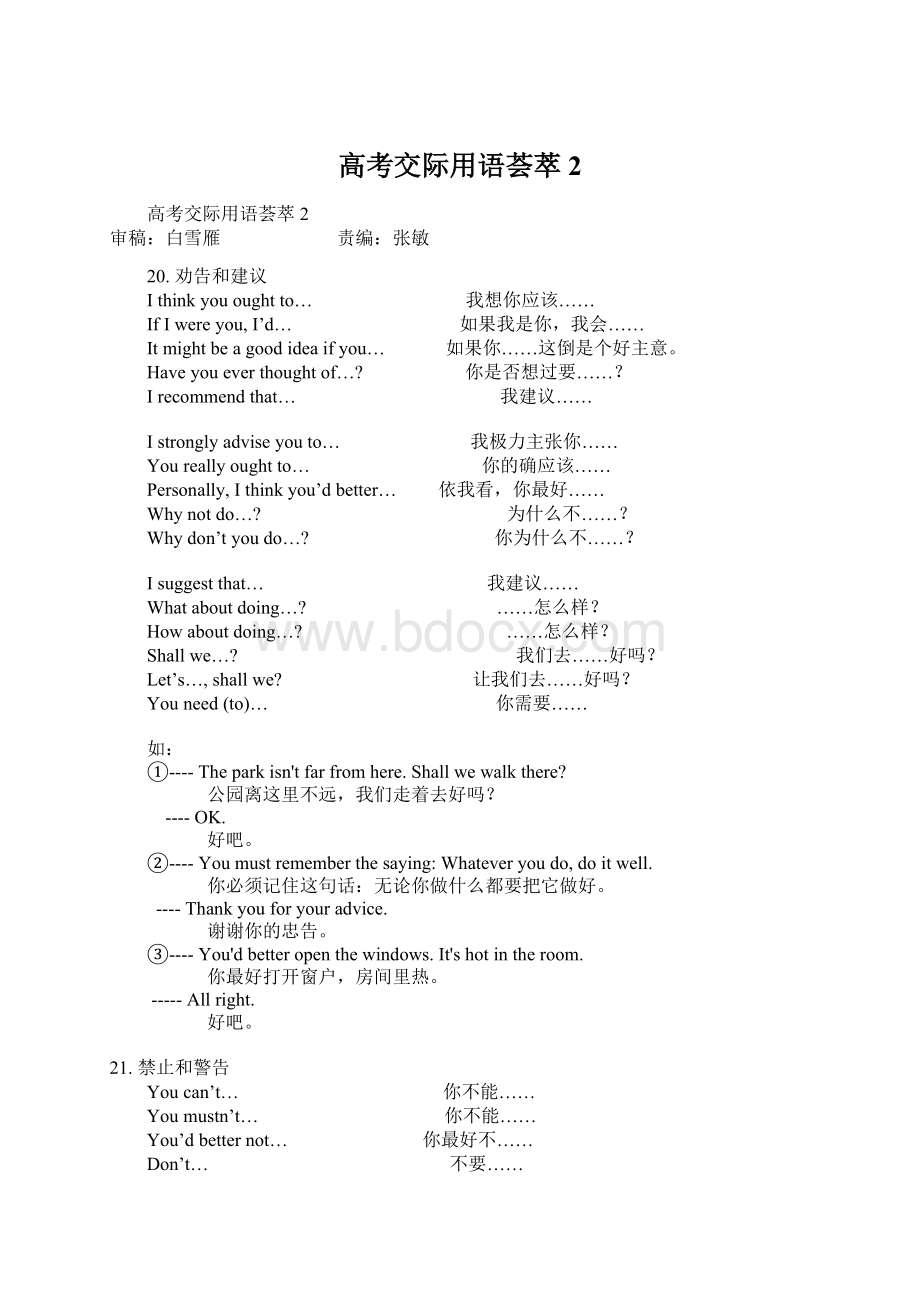高考交际用语荟萃2Word下载.docx
《高考交际用语荟萃2Word下载.docx》由会员分享,可在线阅读,更多相关《高考交际用语荟萃2Word下载.docx(15页珍藏版)》请在冰豆网上搜索。

你必须记住这句话:
无论你做什么都要把它做好。
----Thankyouforyouradvice.
谢谢你的忠告。
③----You'
dbetteropenthewindows.It'
shotintheroom.
你最好打开窗户,房间里热。
-----Allright.
21.禁止和警告
Youcan’t… 你不能……
Youmustn’t… 你不能……
You’dbetternot… 你最好不……
Don’t… 不要……
Takecare!
当心!
Becareful!
当心!
Lookout!
当心!
Ifyou…,youwill… 如果你……,你将……
Youarenotallowedto… 不允许你……
①----Youmustn'
tplayontheroad.It'
sdangerous.
你不能在马路上玩,这很危险。
----No,Iwon'
t.
我不会在马路上玩的。
②----Youarenotallowedtoparkhere.
不允许你在这里停车。
----Oh,I'
msorry.
哦,对不起。
③----Lookout!
Youcouldfallofftheladder.
当心!
你会从梯子上掉下去的。
----Oh,thankyou.
哦,谢谢你。
22.许诺
Ipromise… 我答应……
Youshall… 你将得到……
Iwillgive…toyou. 我会把……给你。
----WhenshallIhaveanewtoy,Mum?
妈妈,我什么时候才能有个新玩具?
-----YoushallhaveitonyourbirthdaynextWednesday.
下周三你过生日时会有一个的。
23.惊奇
Really?
真的?
(常用在听到高兴或忧伤的消息时以表示惊异的神情)
Ohdear!
哎呀!
/天哪!
Isthatso?
是那样吗?
Goodheavens!
天哪!
Howastonishing!
真惊人!
Howextraordinary!
真不寻常!
Ican’tbelieveit!
我简直不敢相信!
Ican’tbelievemyeyes!
我简直不敢相信自己的眼睛!
Itcan’tbe!
这不可能!
Mygoodness!
天哪!
Oh,that’sincredible!
啊,简直不可思议!
Whatasurprise!
真是出人意料!
What?
你说什么?
Areyouserious?
当真,你不是在开玩笑吧?
①----Ilostmynewbikelastweek.
我上周丢了我的新自行车。
----Really?
真的吗?
②----Heisillagain,andhehasbeenillfortwoweeks.
他又生病了,而且已病了两个星期了。
----Isthatso?
I’msorrytohearthat.
是吗?
听到这个消息我很难过。
③----Jimmyhaswonthefirstprize.
吉米获得了一等奖。
Ican’tbelieveit.
我简直不敢相信。
◆在口语中常把There或Here放在句首,以加强语气,表示说话人的惊讶或感叹,常译成“你瞧”,“哎呀”。
①Goodheavens!
Thereyouare!
天哪!
你终于回来了。
②Oh,myGod!
Hereweare!
嗳,上帝呀!
我们终于到了。
◆There可单独用作感叹句,以引起注意,表示安慰,加强语气等。
①There!
Theworkisdone.
瞧!
事情干完了。
②Therenow!
WhatdidItellyou?
你看!
我怎么跟你说来着?
③There,there,nevermind!
好啦,好啦,不要紧的!
(表示安慰)
④Therenow!
YouseeIwasright.
哎,你瞧,我刚才是对的吧。
(引起注意)
24.焦虑
What’swrong?
怎么啦?
What’sthematterwith…?
……怎么啦?
Isthereanythingthematter?
有什么问题吗?
Oh,whatshallIdonow?
哦,我现在该怎么办?
What’stheproblemwith?
……怎么啦?
What’sthetroublewith…?
……怎么了?
①----What’swrong?
怎么啦?
----Oh,nothingmuch.
哦,没什么。
②----What’sthematterwithyourcomputer?
你的电脑怎么了?
----Itdoesn’twork.
它不工作了。
③----What’swrongwithyoureyes?
你的眼睛怎么了?
----Ican’tseeanythingclearly.
我看不清东西。
④----What’sthetroublewiththeTV?
这台电视怎么了?
----Ithasnopicturesandnocolour.
它即没有图像也没有颜色。
交际用语中易混淆的用法比较:
⒈Nicetomeetyou.和Nicemeetingyou.
这两个句子的意思相同,但Nicetomeetyou.可以用于见面时也可以用于分手时,用于见面其句型省略了“itis”,用于分手时其句型省略了“itwas”。
而Nicemeetingyou.则用于分手时,等于Itwasnicemeetingyou.见面时的客气用语还有:
①I’mverygladtomeetyou.见到你我很高兴。
②Gladtomeetyou.见到你我很高兴。
③It’sa(great)pleasuretomeetyou.见到你我很高兴。
④Pleasedtomeetyou.见到你我很高兴。
在分手时常说:
①Itwasnicemeetingyou.遇见你太好了。
②Nicetohavemeetyou.认识了你很高兴。
⒉助动词do加强语气及转达问候的表达方式:
do可用于祈使句和肯定的陈述句中,置于动词原形前以加强语气。
如果句子动词是过去时用did+动词原形,如果是一般现在时用do+动词原形,第三人称单数用does+动词原形。
读时须重读,翻译时应将其强调的意思表达出来。
①Dogivehermyregards.
请一定代我向她问好。
②Doletmeknowwhenyoumeetwithdifficulty.
遇到难处一定要告诉我。
③IdidbehomesickwhenIwasabroad.
我在国外时可真想家呀。
④Hedoesworkhardatschool.
他在学校学习的确很努力。
◆do作实义动词,可以表示生活学习等方面的情况。
①Heisdoingquitewellatschool.
他在学校学习情况不错。
②IdidwellinEnglishbutbadlyinmaths.
我英语学得很好,但数学学得很糟。
③Howdidyoudointheexamination?
你考得怎么样?
◆do还可表示符合某种需要,可译成“行”,“合适”,“够了”等。
Thisplacewilldoforaworkshop.
这地方作车间合适。
①----WillTuesdaydo?
星期二行吗?
----Sure.
行。
②Idon’tthinktheseshoeswilldoformountain-climbing.
我认为这种鞋不适合于爬山。
⒊WhatcanIdoforyou?
CanIhelpyou?
和IsthereanythingIcandoforyou?
WhatcanIdoforyou?
=CanIhelpyou?
=IsthereanythingIcandoforyou?
这三句话可用于许多不同的情景中,其中文意思要根据上下文及所用于的情景来理解。
①----WhatcanIdoforyou?
您要什么?
----I’dlikeacupofcoffee.
我想要杯咖啡。
②----WhatcanIdoforyou?
您要买什么?
----Headachemedicine.
头痛药。
③----WhatcanIdoforyou?
你要借什么书?
----I’dliketoborrowabookonmedicineandrenewthisone.
我想借一本医学方面的书并续借这本书。
④----WhatcanIdoforyou?
你有什么事?
----Excuseme,isbossin?
请问老板在吗?
⑤----WhatcanIdoforyou?
有什么事吗?
----Couldyoushowmethewaytotheinternetbar?
你能告诉我去网吧的路吗?
⑥----Youaresobusy.WhatcanIdoforyou?
你这么忙,我能帮你做什么吗?
----No,thankyou.
不用了,谢谢。
⒋I’mwell.和I’mgood.
bewell指身体好,其相对应的短语为beill(生病)。
如说“我身体很好”,应说“Iamverywell.”,不能说“I’mverygood.(good指品质好)。
形容词well和ill不能作定语修饰名词,若作定语须用sick和healthy.如说“生病的孩子”应该说asickboy,“健康的孩子”应该说ahealthyboy。
①----Whydoesn’tTomcometoschool?
汤姆怎么没来上学?
----Heisill.
他生病了。
②----Howisyourfather?
你父亲好吗?
----Heisverywell.Thankyou.
他很好,谢谢。
◆I’mverywell.=I’mfeelingquitewell.=I’mfine.=I’mallright.=I’mOK.
◆I’milltoday.=I’mfeelingbadtoday.=I’mfeelingterribletoday.=Idon’tfeelverywelltoday.
⒌It’sapleasuretodo…,It’sapleasure.和withpleasure.
◆It’sapleasuretodo…是客套话,意思是“很高兴做……”,相当于Pleased(或Nice,Great)todo…
①It’sapleasuretomeetyou.
=Pleased(或Nice,Great)tomeetyou.
认识你很高兴。
②It’sapleasureformetobeinvitedtospeakhere.
=I’mgladtobeinvitedtospeakhere.
应邀在这儿发言我深感荣幸。
◆It’sapleasure.=Apleasure.表示“没什么,不用谢。
”“这是我乐意做的。
”类似的习语还有:
It’snothing.Notatall.Youarewelcome.Don’tmentionit.That’sallright.My(Our)pleasure.等,主要用于你帮助了别人或你为别人做了好事,而别人对你说“Thankyou.”时。
①----Thankyou,Mum,formyparty,andforyourbeautifulpresents!
谢谢你,妈妈,为了我的这次聚会,也为你给予的漂亮的礼物。
----Notatall,dear.Itwasapleasure.
不用谢,这是我乐意做的。
②----Thankyouforallthehelpyou’vegivenme.
谢谢你给予我的所有帮助。
----It’sapleasure.
不用谢。
◆Withpleasure.=Yes/Certainly.表示“当然可以”,“愿意效劳”,“行”,“不成问题”,“好的”。
类似的习语还有:
Allright.Noproblem.I’dliketo.等,主要用于别人求你做某事,你很乐意去做的场合。
①----CouldyouhelpmewithmyEnglish?
你能否帮助我学英语?
----Withpleasure.
当然可以。
②----Couldyouposttheletterforme?
你能替我把这封信寄走吗?
愿意效劳。
③----Willyoulendmeahand?
请你帮一下忙,好吗?
----Withpleasure.
好的。
◆pleasure是名词,大多用于客套话中。
①Ihavehadthepleasureofmeetingyourbrotherbefore.
我以前有幸见过令兄或令弟。
②MayIhavethepleasureofyourcompanyatdinner?
我可否有和你一起吃饭的荣幸?
⒍Allright.That’sallright.和That’sright.
◆Allright.意思是“行”,“可以”,表示同意对方的建议或要求,这时也可以用OK.
①----Tellmeabouthim,please.
把他的情况给我讲讲吧。
----OK./Allright.
好吧。
②----Let’snotdothat.Allright?
那件事我们别做了,行吗?
◆OK.和Allright.还可以表示“身体很好”或“已经康复”的意思。
①----Isheallright?
他很好吗?
----Heisquiteallright.
他很好。
②----Howareyoutoday?
你今天感觉(身体)怎么样?
----I’mallright.Thankyou.
我很好,谢谢。
◆That’sright.意思是“对了”,表示赞同对方的意见、看法或行为,肯定对方的答案或判断,其相反说法是“That’swrong.”。
①----Wemusthelphim.
我们必须帮助他。
----That’sright.
说得对。
②YouarenotEnglish.YouareAmerican.Isthatright?
你不是英国人,你是美国人,(我说的)对吗?
③Ithinkthat’sright.
我想那是对的。
◆That’sallright.意思是“没关系”,“不用谢”,用作回答对方的道歉或感谢。
①----I’mverysorryIcan’tdoit.
非常对不起,我做不了。
----That’sallright.
没关系。
(回答对方的道歉)
②----Manythanks.
非常感谢。
(回答对方的谢意)
⒎Whatdoyoulikeabout…?
Howdoyoulike…?
和What’s…like?
◆Whatdoyoulikeabout…?
是用来询问对方具体哪一方面喜欢某人或某事物,此时what作like的宾语,不用how.
①----Whatdoyoulikeabouthim?
你喜欢他哪一点呢?
----Honestyanddiligence.
诚实与勤奋。
②----Whatdoyoudislikeaboutsmoking?
你哪一点不喜欢吸烟呢?
----Smellyrooms.
房间里难闻的气味。
◆Howdoyoulike…?
用于询问对方对某一事物的看法,此时how作状语,不能用what代替,句中的like还可用find代替,如果用thinkof代替like,疑问词应用what.
①----Howdoyoulike/findthecity?
你觉得这座城市怎么样?
----Verybeautiful.
很美丽。
②----Whatdoyouthinkofthenovel?
你认为这部小说怎么样?
----Veryinteresting.
很有趣。
③Tellmehowyoulikemyplan
跟我说说你对我的计划的看法。
◆What’s…like?
是用来询问某人、某一活动,某一电影、某一小说或某一场所等留给人的印象,要求对方所询问的有关事物作出简单的评价,描述外貌等,句中like为介词。
①----What’syourEnglishteacherlike?
你的英语老师是什么样子的?
----Heistallandhandsome.
他